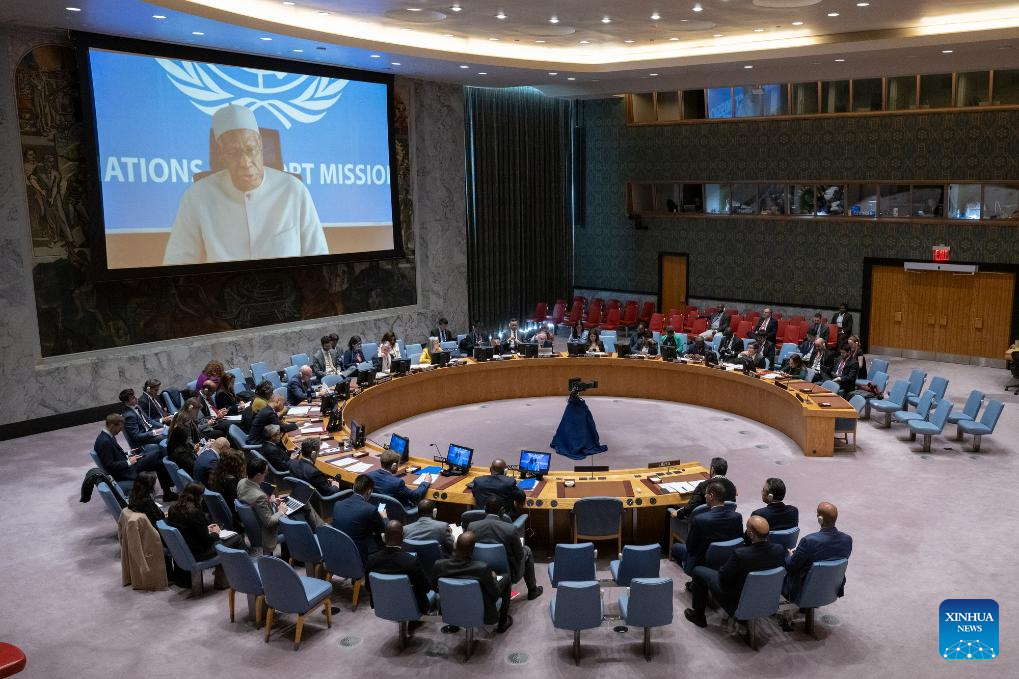
Abdoulaye Bathily (on the screen), the UN secretary-general’s special representative for Libya
UNITED NATIONS, Oct. 17 (NNN-XINHUA) — The top UN envoy for Libya, Abdoulaye Bathily, warned on Monday that disagreements over electoral laws and the formation of a new government carry the risk of another political crisis in Libya.
The finalization of the electoral laws by the 6+6 Joint Committee offers the opportunity to break the current stalemate in Libya. However, the rejection of the amendments made by the committee after talks in June in Morocco by the Tripoli-based High Council of State (HCS) constitutes a political option that risks jeopardizing the hard-won gains, said Bathily, the UN secretary-general’s special representative for Libya.
The 6+6 Joint Committee is a joint legislative committee composed of six members from the HCS and six members from the Tobruk-based House of Representatives (HoR), or parliament, with the task of producing laws for the upcoming elections.
The HoR unanimously approved the amended laws in early October. However, the HCS rejected the amendments. The HCS said it only approves the 6+6 committee outcomes produced during talks held in June in Morocco.
“I call on the HCS to renounce this position, which risks obstructing the electoral process,” said Bathily in his briefing to the Security Council.
The controversy between the HoR and the HCS over the laws, the highly contentious issue of the formation of a new government, the linkage between the presidential and parliamentary elections, and the possibility of misuse of the conditionalities attached to the mandatory second round of the presidential elections put the whole electoral process at risk of another political crisis, which could lead to a remake of the December 2021 scenario or the August 2022 crisis, warned Bathily.
Libya failed to hold general elections in December 2021 as previously scheduled due to disagreements over election laws. In August 2022, the HoR-designated prime minister called on the Tripoli-based prime minister to hand over power, creating a political impasse.
Bathily asked the Security Council to prevent such risks.
“I wish to alert you to the risks of violent conflict involved by a unilateral appointment of a government by any of the rival parties and call on this (Security) Council to use its influence to prevent this dangerous occurrence and mobilize the Libyan parties for dialogue,” he said.
Only the genuine commitment of all parties to serving the interests of the people for peace, stability and prosperity can produce a positive electoral outcome. Laws alone cannot and will not make elections happen. They need to be supported by the buy-in of a wide range of stakeholders, he said.
“I call on all stakeholders, including major leaders, to meet and agree on a binding political settlement toward a peaceful electoral process, the backbone of which will be a unified government to lead Libya to elections,” said Bathily.
He called on all international partners of Libya to support this electoral process as the only way to provide the country with legitimate institutions and a future of peace, unity, stability, and prosperity.
“This outcome is long awaited by Libyan citizens who wish to close the chapter of conflict and risks of disintegration for their country. The ongoing crises in Sudan, the Sahel and the region and their potential spillover effects on Libya constitute serious threats that must not be taken lightly,” he said. — NNN-XINHUA
